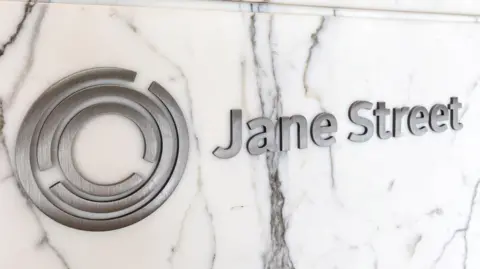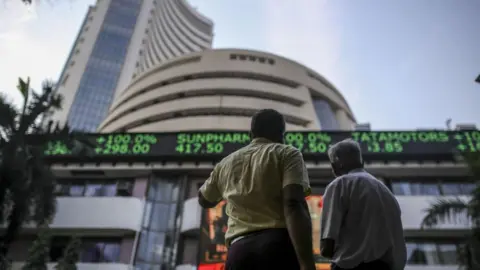Why Jane Street, a US trading giant, is in trouble in India
 Reuters
ReutersNew York based trading giant Jane Street has been in the eye of a storm over the past few weeks after India's market regulator banned it from the securities market.
The regulator Securities and Exchange Board of India (Sebi) has accused Jane Street of indulging in a "sinister scheme", alleging that its "manipulation" of India's stock market has led to small investors trading at "unfavourable and misleading prices".
Jane Street has not responded to the BBC's request for comment, but according to the Financial Times, the firm has told staff in an internal email that it was "beyond disappointed" by Sebi's order and planned to challenge it.
So what is Jane Street, and what are they accused of?
What is Jane Street?
Jane Street was founded by a small group of traders and technologists in a tiny New York office. It is a quantitative trading firm which uses mathematical models and algorithms to decide trading strategies.
The company has more than 3000 employees who trade in a broad range of asset classes across 45 countries. According to the Financial Times, the firm accounted for over 10% of North America's equity trading volume in 2023, making it a significant player on Wall Street.
What is Jane Street accused of doing?
India's stock market has two main segments. The cash market is where investors buy and sell actual shares of companies, owning a piece of the business. And the derivatives market is where traders use tools like futures and options to bet on stocks or commodities, without owning the underlying shares.
Sebi claims the suspicious trading activity by Jane Street happened on India's Bank Nifty index which tracks the performance of 12 large Indian banks.
The regulator alleges that Jane Street operated in both the cash and derivatives market through different entities.
So on a very basic level what is alleged is, one entity bought large quantities of bank shares – pushing up the price of Bank Nifty when the market opened in the morning.
Simultaneously, it's claimed, the second entity would bet on the decline in Bank Nifty's value in the derivatives market.
On the day of expiry - when the contracts are settled in the derivative market - as the trading session inched towards close of day, Jane Street, it's claimed, dumped the bank shares it bought in the cash market, causing the bank index price to plunge. This, in turn, would pay off the bet taken by its other entity in the derivatives market on a decline in prices, Sebi says.
"Such a trade is called 'marking the close' which is considered illegal even in the US," says Deepak Shenoy, CEO, Capitalmind Asset Management Pvt Ltd in Bengaluru city.
Mom and pop investors lost money because during the day they'd bought shares at higher levels, as they were pushed up because of the big volumes bought by Jane Street.
What has Sebi said?
Sebi basically said Jane Street's activities created "a false or misleading appearance of market activity" and attracted "unsuspecting" investors to trade at levels that were "artificial and temporary".
By doing this, it was enticing unsuspecting investors to trade in Bank Nifty index options at interim levels that were artificial and temporary.
On 3 July, in a lengthy order, Sebi concluded that "the integrity of the market, and the faith of millions of small investors and traders, can no longer be held hostage to the machinations of such an untrustworthy actor".
 Getty Images
Getty ImagesWhat is Jane Street's defence?
As per several global media reports, Jane Street has denied all these allegations of wrongdoing and described the trades as "basic index arbitrage" - the price differential between the price of a stock in the cash market and its corresponding derivatives contract - saying it plans to challenge SEBI's order.
What do independent experts think?
"Index arbitrage is legal and even Indian broking firms have done this for ages and used algorithms and machines to trade in the market. But what they (Jane Street) did is not index arbitrage," claims says Mr Shenoy.
"What they have done is taken a position in two different markets. And this is not arbitrage. You took X on one side and 7X on other side. You sold that X and gained from 7X. That is the problem," he explains.
"The same script would play out every week on expiry day when index contracts are settled," says Mayank Bansal, a UAE-based investor who operates in India's derivatives market . "While retail investors lost money expecting a strong finish, Jane Street would have profited by betting on a fall and we are talking of a trade of millions of dollars."
"It is not illegal to be smarter than your counterparties in a swap transaction. However if you read the allegations made in the Sebi filing, the whole thing appears to stink very badly," Alexander Gerko, CEO of XTX, a rival firm of Jane Street, wrote on his LinkedIn account.
 Getty Images
Getty ImagesWhat impact will this have on the broader markets?
According to recent data from the regulator, there are nearly 10 million retail investors in the derivatives market. In FY25 they lost 1.05 trillion rupees ($11.6bn, £8.6bn) up from 750bn rupees in FY24.
On average, each retail investor lost 110,069 rupees ($1,283; £958) last year.
While these losses cannot be attributed to Jane Street directly, Sebi says the firm made $4.3bn from India in a little over two years while small investors were bleeding.
"They've rigged the prices for their own convenience," a Mumbai-based investor, who didn't want to be named, alleged to the BBC.
"On 17 January 2024, Sebi says Jane Street had its most profitable day. I lost nearly $7,000, my worst single-day loss in a year."
The episode exposes deeper regulatory concerns say experts.
"SEBI should have acted before so many people lost their money," says Mr Bansal. "The surveillance systems must be strong enough to detect and stop manipulation in real time. Who knows how many more players are operating like this here," he says.
So, what happens next?
The Indian market regulator says Jane Street has deposited just over $560mn in an escrow account with a lien marked in favour of Sebi, requesting it to lift the temporary trading ban.
Sebi says Jane Street's request to remove the trading ban is currently "under examination".
But under Indian laws, if these allegations of market manipulation are proven, the US trader could face a fine that is up to three times this amount.
